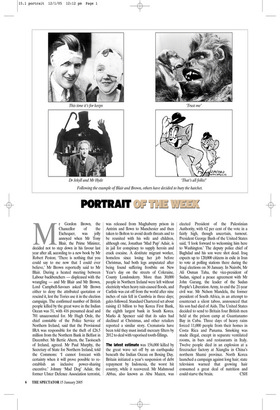PORTRAIT OW THE WEEK M r Gordon Brown, the Chancellor of
the Exchequer, was jolly annoyed when Mr Tony Blair, the Prime Minister, decided not to step down in his favour last year after all, according to a new book by Mr Robert Peston; ‘There is nothing that you could say to me now that I could ever believe,’ Mr Brown reportedly said to Mr Blair. During a heated meeting between Labour backbenchers — displeased with the wrangling — and Mr Blair and Mr Brown, Lord Campbell-Savours asked Mr Brown either to deny the attributed quotation or rescind it, lest the Tories use it in the election campaign. The confirmed number of British people killed by the great wave in the Indian Ocean was 51, with 416 presumed dead and 701 unaccounted for. Mr Hugh Orde, the chief constable of the Police Service of Northern Ireland, said that the Provisional IRA was responsible for the theft of £26.5 million from the Northern Bank in Belfast in December. Mr Bertie Ahern, the Taoiseach of Ireland, agreed. Mr Paul Murphy, the Secretary of State for Northern Ireland, told the Commons: ‘I cannot forecast with certainty when it will prove possible to reestablish an inclusive power-sharing executive.’ Johnny ‘Mad Dog’ Adair, the former Ulster Defence Association terrorist, was released from Maghaberry prison in Antrim and flown to Manchester and then taken to Bolton to avoid death threats and to be reunited with his wife and children, although one, Jonathan ‘Mad Pup’ Adair, is in jail for conspiracy to supply heroin and crack cocaine. A destitute migrant worker, homeless since losing her job before Christmas, had both legs amputated after being found suffering frostbite on New Year’s day on the streets of Coleraine, County Londonderry. More than 30,000 people in Northern Ireland were left without electricity when heavy rain caused floods, and Carlisle was cut off from the world after nine inches of rain fell in Cumbria in three days; gales followed. Standard Chartered set about raising £1 billion to buy Korea First Bank, the eighth largest bank in South Korea. Marks & Spencer said that its sales had declined at Christmas, and other retailers reported a similar story. Crematoria have been told they must install mercury filters by 2012 to deal with vaporised tooth-fillings.
The latest estimate was 156,000 killed by the great wave set off by an earthquake beneath the Indian Ocean on Boxing Day. Britain initiated a year’s suspension of debt repayment by Indonesia, the worst hit country, while it recovered. Mr Mahmoud Abbas, also known as Abu Mazen, was elected President of the Palestinian Authority, with 62 per cent of the vote in a fairly high, though uncertain, turnout. President George Bush of the United States said, ‘I look forward to welcoming him here to Washington.’ The deputy police chief of Baghdad and his son were shot dead. Iraq expects up to 120,000 citizens in exile in Iran to vote at polling stations there during the Iraqi elections on 30 January. In Nairobi, Mr Ali Osman Taha, the vice-president of Sudan, signed a peace agreement with Mr John Garang, the leader of the Sudan People’s Liberation Army, to end the 21-year civil war. Mr Nelson Mandela, the former president of South Africa, in an attempt to counteract a silent taboo, announced that his son had died of Aids. The United States decided to send to Britain four British men held at the prison camp at Guantanamo Bay in Cuba. Three days of heavy rains forced 11,000 people from their homes in Costa Rica and Panama. Smoking was made illegal, except in separate ventilated rooms, in bars and restaurants in Italy. Twelve people died in an explosion at a firecracker factory at Xiangliu in China’s northern Shanxi province. North Korea launched a campaign against long hair; state television warned that growing hair consumed a great deal of nutrition and could starve the brain. CSH





















































 Previous page
Previous page